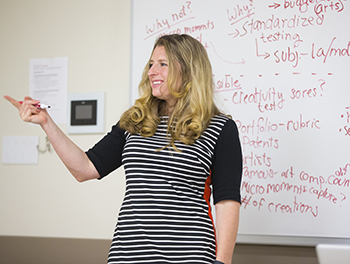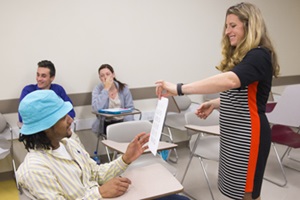Topic: Teachers College
June 6, 2016

Photo by Michael Hickey
In Lisa Rubenstein’s Development of Creative Thinking class, she and students discuss what creativity is, how you develop it and, for teachers, how you teach and evaluate it. The class is open to all students.
For Lisa Rubenstein, it’s all about connecting.
The assistant professor of educational psychology wanted to be a doctor and, as a college sophomore, was a medical assistant in a Nigerian hospital — even scrubbing in for surgeries.
“It was an incredible opportunity, but while I was there, I just … .” Her voice trails off. “I very much love people. I realized a doctor doesn’t have, necessarily, the time to build that personal connection with patients. That’s the piece I really wanted.”
She found those ties through teaching. Her research focuses on helping children, and she challenges her students to learn how to solve problems in class and use those skills in their teaching careers. Her ability to combine her passions and focus on connections brought her Ball State’s Outstanding Junior Faculty Award, just a year after an Excellence in Teaching Award.
Colleagues applaud the latest honor for Rubenstein’s first four years on campus.
“Teaching comes naturally to her; she’s just incredibly productive in her research; and she has a perspective on education that allows her to serve the college and university,” said Sharon Paulson, departmental chair and professor of psychology. “I think she could potentially be a star in her field.”
Becoming a teacher
After realizing medicine was not her calling, Rubenstein spent her last two months in Nigeria as an elementary school aide, followed closely by substitute teaching in New Castle, Indiana. There, one teacher’s example solidified Rubenstein’s commitment to education.
“Teaching comes naturally to her; she’s just incredibly productive in her research; and she has a perspective on education that allows her to serve the college and university.”
— Sharon Paulson
chair of Department of Educational Psychology
“At the end of the day, as students were leaving, no matter what happened that day, they either got a high-five or a hug, and it was their choice. Education is very important, but it’s also about personal relationships and making sure everyone feels like a valued member of the community.”
She creates that atmosphere in class, said senior elementary education major Carter McClure.
“She gives every student a chance to talk, and she listens to the idea,” said McClure, who is getting licensed in gifted and talented education.
“If someone answers a question completely wrong, she always finds a way to make it useful in some way. I think the class is very comfortable around her.”
Getting past survival
Rubenstein admits it took time to get there.
“You start by being focused on yourself. You’re on a survival level: just get through the day, don’t do anything stupid.
“The next stage is, it’s all about the curriculum. And the final stage is how do you meet the needs of the students?

Photo by Michael Hickey
“The creativity class was easily the best class I ever took,” said Richelle Moore, ’15. “It was so much fun. She taught those classes very creatively, which I think was ingenious. I would suggest that everyone, no matter what your major is, take that creativity class. It was truly amazing.”
“I thought, ‘Well, now that I know this, I can skip those first two stages,” she said, laughing. “But even as a college professor with experience in an elementary classroom, I still had to experience all those stages.”
As an example, she began by lecturing about gifted students who underachieve. Then she tweaked a PowerPoint on the topic to make it more engaging. The final step was to outline a hypothetical scenario and hand it over to her students, asking: “What should you do?”
Armed with entrepreneurial skills of creativity and problem-solving, thanks to their classroom work, her undergrads get into the community to observe classes and plan and deliver activities.
They’ve designed weekly creativity and enrichment clubs as part of a partnership between Ball State’s Center for Gifted Studies and Talent Development and Burris Laboratory School.
“They took strategies that we learned — to develop creative thinking — and created lessons that actually develop creative thinking,” she said. “You absolutely need these practical experiences to make sure you’re in the right field and to develop as a professional.”
The draw of research and service
While getting her master’s in gifted education, Rubenstein’s curiosity fell in love with research. Her main interests now include the development of creative and critical thinking, as well as understanding the experiences of gifted students with autism spectrum disorder.
“She’s constantly expanding a base of knowledge that she has and that we as a field haven’t resolved.”
— Susan Wilczynski
director of Center for Autism Spectrum Disorder
“She’s constantly expanding a base of knowledge that she has and that we as a field haven’t resolved,” said Susan Wilczynski, director of the Center for Autism Spectrum Disorder and Plassman Family Distinguished Professor of Special Education and Applied Behavior Analysis.
And Rubenstein’s research looks forward in a practical, service-focused way, said Jerrell Cassady, a psychology professor in ed psych. “She thinks ahead four to five years from her current research. It always comes back to methods for teachers to make the life of a real child better.”
Another service has been creating and leading a recruitment plan for the undergrad gifted and talented program in Teachers College, plus being its coordinator and primary advisor — accomplishments that a colleague noted when he nominated her for the award.
“Such efforts are truly extraordinary for a new assistant professor in the first years of her career,” said Holmes Finch, the George and Frances Ball Distinguished Professor of Educational Psychology.
Changes for the good
Her students use their knowledge when teaching, as Richelle Moore did when she student-taught Japanese language and culture last fall in Fort Wayne. The creativity skills she learned helped her evaluate that ability in her students’ projects.
Teachers often assess creativity by whether a project has color and is neat, she said. Moore, who graduated in December with a minor in gifted and talented education, focused on whether a student thought of many ideas and picked the best one for a project.
“I would argue that creativity’s a skill, and if you practice it, you will become a more creative individual.”
And if a lesson flops? Moore was prepared with problem-solving skills.
“If an assignment failed, I come up with a new one. Her classes just changed me far, far, far for the better, not just as a teacher but as a person.”
That delights Rubenstein.
“I love when my students go out in the field, and they make those connections in their own class that came from something we talked about in our class. That is really cool because you know that something stuck with them and clicked. It’s truly inspiring.”
 Passionate about teaching?
Passionate about teaching?
Ball State is the place for future teachers. Study elementary education, special education, educational studies, educational psychology, educational leadership or counseling psychology and guidance services.
See the Teachers College's programs.
By Judy Wolf, Communications Specialist